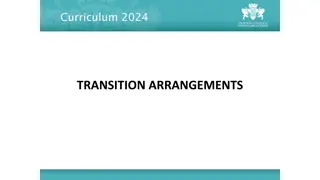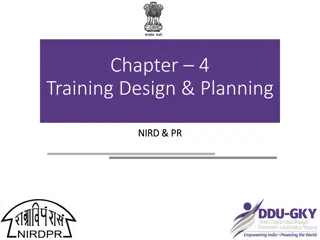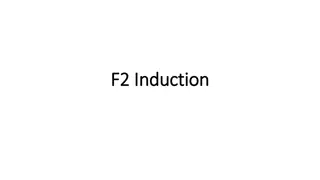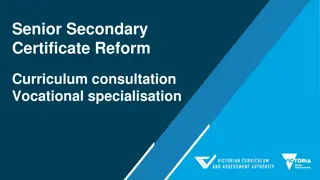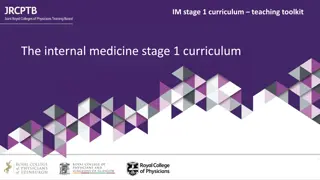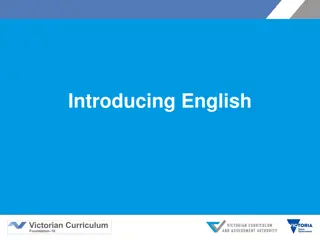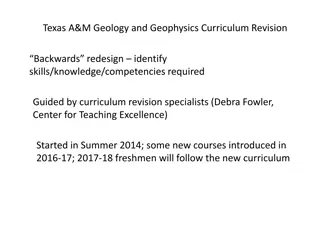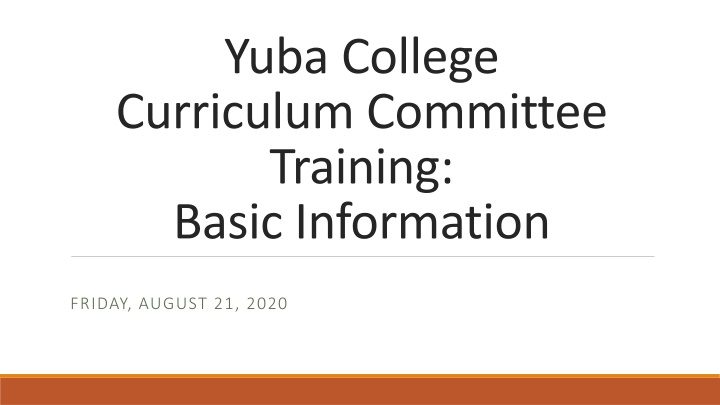
Yuba College Curriculum Committee: Ensuring Quality and Compliance
The Yuba College Curriculum Committee plays a crucial role in ensuring compliance with educational policies, developing curricula that meet student needs, and maintaining the integrity of the College's course offerings. With a specific membership structure and defined purposes, the committee oversees curriculum planning, updates course offerings, and assists faculty in various educational initiatives. Discover the essential functions and responsibilities of the dedicated committee at Yuba College.
Download Presentation

Please find below an Image/Link to download the presentation.
The content on the website is provided AS IS for your information and personal use only. It may not be sold, licensed, or shared on other websites without obtaining consent from the author. If you encounter any issues during the download, it is possible that the publisher has removed the file from their server.
You are allowed to download the files provided on this website for personal or commercial use, subject to the condition that they are used lawfully. All files are the property of their respective owners.
The content on the website is provided AS IS for your information and personal use only. It may not be sold, licensed, or shared on other websites without obtaining consent from the author.
E N D
Presentation Transcript
Yuba College Curriculum Committee Training: Basic Information FRIDAY, AUGUST 21, 2020
The Curriculum Committee Title 5 requires colleges to establish a committee to ensure compliance of all curriculum before it goes to Board of Trustees (BoT) or state for approval. Title 5 section 55002 specifically mentions the curriculum committee as one that includes faculty and may be a committee of the academic senate.
Curriculum Committee Membership At Yuba College, the Curriculum Committee is a standing committee of the Academic Senate. It is responsible for ensuring the quality, currency and planning of the College curriculum. Membership includes: 2 faculty Curriculum Coordinators selected through FAYCCD s Contract Coordinator process (One is the Co-Chair; the other is the technical support.) Faculty division reps appointed by Senate (2 Faculty at Large, 1 Counseling, 2 CTE, 1 Fine Arts, 1 HPE, 1 Language Arts, 1 MESH, 1 Social Science, and 2 Adjunct) Vice President of Instruction (serves as the Co-Chair) and 3 Administration Representatives Recorder (non voting) Resources: District Curriculum Analyst/Articulation (not on our Charter) Financial Aid Director
Curriculum Committee Purpose Under the purview of the Academic Senate, recommends the future direction of educational program and curricula offerings of the College. Promotes development of curricula and courses that meet the identified needs of the students, community, regional work places, and global society. Ensures that general education and associate degree requirements are appropriate to meet the goals of the College and the needs of students and the communities the College serves.
Purpose Continued Determines the appropriateness of new and revised course or educational program proposals for departments or disciplines. Ensures the quality, consistency, integrity, and feasibility of the College curriculum. Ensures compliance with statewide educational policy and articulation with other educational institutions. Ensures that all Course Outlines of Record are updated every five years. Ensures that courses that have not been offered in more than three years and degrees and certificates that have not been awarded in more than five years are inactivated.
Purpose Continued Assists department faculty in completing appropriate Transfer Model Curriculum (TMC), obtaining Course Identification Number (C-ID) approval, and submitting Associate Degree for Transfer (ADT). Establishes and monitors the work of subcommittees. Examines topical instructional issues of major importance to the College Trains faculty in the use of eLumen.
Curriculum Management System In Fall 2020 YCCD will transition from CurrIQunet Meta to eLumen for a more integrated curriculum management system. (More training is coming soon!) Reverse engineered to contain fields or prompts to attach all information and supporting documentation we need to be in compliance Serves as a repository for curriculum, documentation of compliance for state and ACCJC, and mechanism for facilitating and archiving the approval workflow Users have specific levels of permissions Faculty have discipline originator/reviewer rights in areas for which they have min quals CC division reps have temporary access to fields in their division that lack FT faculty Counselors have both discipline rights to COUNS, and review rights for all curriculum
The Curriculum Approval Process Committee Review and Approval Department Review Board Approval State Approval Proposal Origination Discipline faculty with min quals (or designated division rep) creates/submits proposal Dep. members (FT/PT), Counselors, and area Dean notified to review and comment CC members receive notification to review and leave comments Approved curriculum sent to Board of Trustees Curriculum Specialist completes approval process and sets effective term once proposal receives state approval or chaptering and control number if needed. If significant edits needed, Co-Chair sends it back to originator; if not, proposal is voted on. If approved, moves to consent agenda for another vote Curriculum Specialist moves curriculum forward to next stage after BoT approval CC Coordinators and Curriculum Specialist review CC Co-Chair moves curriculum to next stage
The Process Can Be A Little More Complicated (Sometimes) Departmental disagreements Faculty wait to make changes requested by CC Proposal just misses cutoff for Board of Trustees approval and waits another month Proposal is missing data/inaccurate and is rejected by state Board approval expires before proposal is submitted to state (waiting for supporting docs) CTE - needs advisory committee and regional consortium minutes Transfer - courses wait for C-ID, IGETC, etc.
To Schedule A Course, It Must Have: A Course Control Number (CCN)from the state Chancellor s Office generated at State Approval level An Effective term <6 years old monitor in program review, see COR (course outline) for effective term Active status in the Curriculum management system and Colleague approved curriculum goes active on Aug 1 for Fall, January 1 for Spring Be published in college catalog or addendum And, if the course is DE: Course must be approved by Curriculum Committee for DE on COR (course outline) Instructor must be trained for DE Section/course shell must be reviewed by DE Committee for CVC-OEI rubric compliance Best practice: Don t plan to offer courses intended for GE/transfer until approved for University of California Transfer Course Agreement (UC-TCA), Intersegmental General Education Transfer Curriculum (IGETC), California State University General Education-Breath (CSU GE-B), Common Course Identification ( C-ID), etc. (Timelines of these approvals will be provided in another training.)
Your Role As A Curriculum Committee Member in Committee Review Content review looks at the appropriateness of the content, objectives, SLOs, assignments, etc. to the discipline. 1. Discipline faculty do content review and leave comments for CC members to see CC members trained to looked for specific things in content: Assignment of a discipline, min qualifications Avoiding duplication of existing curriculum Appropriateness to college mission Integration of elements of COR (content, objectives, assignments, etc.) Justification for advisories, requisites, GE petitions, DE modalities Technical review ensures complete data, compliance, and consistency 2. Completed by CC members, Co-Chairs, and Curriculum Specialist
With What Do We Need To Comply? Legislation: CA Education Code: statute, determined by legislature 1. Regulations: CA Code of Regulations, Title 5: interprets Ed Code into regs, determined by BOG 2. Program and Course Approval Handbook (PCAH): Establishes specific guidelines for implementing Title 5, developed by Chancellor s Office with CCC Curriculum Committee (5C) 3. Chancellor s Office Guidelines: Memos and legal opinions to further clarify compliance with regs 4. ASCCC papers and reference guides: Provide faculty-derived best practices in many areas; develop Minimum Qualifications list 5.
More Compliance. Laws: Transfer institutions: Federal Financial Aid Title IX, etc. section 508, ADA Brown Act C-ID descriptors Articulation agreements CSU/UC: UC-TCA, IGETC, CSU GEB College and District policies: Industry and Regional factors: College mission/master planning District BPs, APs Committee Operating Agreement approved by local senate CTE advisory committees Regional Consortia LMI
Compliance And Quality Impacts: Approval: Certification and correct data for COCI speed up the process Apportionment: Title 5 ( 55100, 55130) now gives the Chancellor s Office the authority to limit or terminate the ability of a district to offer [curriculum] until such time a district demonstrates compliance with all requirements for certification. Articulation: Curriculum is evaluated for quality by transfer institutions, C-ID, and external regulatory bodies. Accreditation: Standard IIA3, among others, requires certain elements for courses, including Student Learning Outcomes, resources, etc. Access: Ultimately, quality assurance matters for the students. When faculty design good curriculum, students have access to courses and programs that are current, cohesive, and clear about goals and pathways.
How Do We Ensure Compliance? Our curriculum management system is designed to include all requirements of COCI, PCAH and Title 5 Includes comprehensive Curriculum Development and Approval Guide for the district CC members review all of the fields (technical and content review) for compliance and quality. Review comments are documented in our curriculum management system Ongoing professional development for committee members, Curriculum Institute, ASCCC regional mtgs, committee retreats
State Approval: Curriculum Streamlining And Local Certification Complaints about lengthy approval process and the queue on Q Street led to curriculum streamlining at the CCC Chancellor s Office. State approval is now much faster, but burden is on colleges to certify that all curriculum is compliant with Ed Code, Title 5, and PCAH. October each year - colleges certify that all curriculum is compliant Signed by College Pres, Vice Pres, Academic Senate Pres, Curriculum Co-Chair Colleges that certify are eligible for auto approval of:Chancellor s Office still reviews all ADTs (new and revised all credit and noncredit courses modified credit programs (except ADTs)Chancellor s Office still reviews all ADTs (new and revised new credit programs with local goal (not CTE or transfer) CTE programs that are C-ID aligned (model curriculum) Noncredit CDCP certificates, except short-term vocational
What Are We Certifying? Course hours and units are correct in accordance with CCCCO Course Calculations; The college/district course outline of record has been approved by the District Governing Board; The college has developed local policy, regulations, or procedures specifying the accepted relationship between contact hours, outside-of-class hours, and credit for calculating credit hours to ensure consistency in awarding units of credit; Credit cooperative work experience plan has local board approval and is on file; Credit and noncredit courses and programs that are submitted to the Chancellor s Office Curriculum Inventory (COCI) system are accurate and compliant with California Education Code, California Code of Regulations, title 5, and the current CCCCO Program and Course Approval Handbook (PCAH); Credit and noncredit programs have the required attachments in accordance with the current CCCCO PCAH; and Mandatory training for curriculum committees and responsible administrators regarding curriculum rules and regulations to ensure compliance ((CCR, 55002(a) (1)).
Financial Aid Implications (For Students To Receive Money) Courses + programs must have state approval and be listed in COCI (Curriculum Inventory) COCI needs to match exactly with catalog, eLumen, and Title IV Federal Financial Aid PPA (Program Participation Agreement) Degrees eligible for FA if approved according to regs with supporting documentation of CTE or transfer goal For certificates (other than IGETC/CSU GEB) to be eligible Certificate must lead to gainful employment in recognized occupation At least 600 clock hours, 16 semester credit hours AND 15 weeks of instruction DE Courses must show regular, effective contact - otherwise, considered correspondence courses and not eligible for FA
Acronyms AAM - Articulation Agreement by Major ACCJC - Accreditation Commission for Community and Junior Colleges ADT - Associate Degree for Transfer ASCCC - Academic Senate for CA Community Colleges ASSIST - Articulation System Stimulating Interinstitutional Student Transfer CB - Course Basic (Codes) CCCCO - CA Community Colleges Chancellor s Office CDCP - Career Development and College Preparation C-ID - Course Identification Numbering System CIO - Chief Instructional Officer CIP - Classification of Instructional Programs COCI - Chancellor s Office Curriculum Inventory COR - Course Outline of Record CSU GE-B- CA State Univ. General Education-Breadth CTE (or CE) - Career Technical Education DE - Distance Education GE - General Education IGETC-Intersegmental General Education Transfer Curriculum LMI - Labor Market Information MIS - Management Information Systems MQ - Minimum Qualifications OER - Open educational resources PCAH - Program and Course Approval Handbook SOC - Standard Occupational Classification TMC - Transfer Model Curriculum TOP - Taxonomy of Programs UC-TCA - Univ. of CA Transfer Course Agreement
More Information Curriculum Committee Website: (updates in progress) Committee meetings, agendas, minutes, purpose statement Local policies Curriculum Development and Approval Guidelines Resource Links - more on eLumen coming soon! Program and Course Approval Handbook 7th edition (known as the PCAH) https://www.cccco.edu/-/media/CCCCO- Website/Reports/CCCCO_Report_Program_Course_Approval-web- 102819.ashx?la=en&hash=8E54C44CB97423B024D18C7AB13C456F91FB03E3
Next Training: The Course Outline of Record





